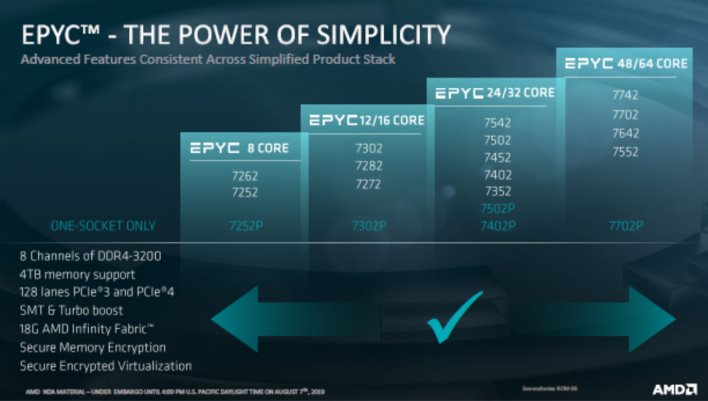AMD EPYC 7002 Series Zen 2 Architecture Doubles Data Center Performance And Density
The leading-edge processor, the EPYC 7742, has base and boost frequencies of 2.25GHz and 3.4GHz, respectively. But as you peruse the list, you’ll see that some of the lower core count chips have much higher base clocks, to address customers with a need for higher single-thread or lightly-threaded performance.
Another thing you’ll notice looking through the stack is that all of the processors have similar features – the number of PCI lanes and memory support doesn’t change, it’s only the number of cores, frequencies, and total cache that differentiate the parts. The instruction support and feature set is the same up and down the stack.
All of Zen 2 architectural enhancements equate not only to better IPC and single / low-thread performance, but heavily multi-threaded and math-intensive workloads will receive a big performance uplift as well. Couple Zen 2’s enhancements with the increase in density per socket, in addition to support for faster memory, and PCIe 4.0, and the total platform performance increase for the EPYC 7002 series is massive.
AMD was showing off a number of workloads in a demo area and also announced that it’s EPYC 7002 series has broken nearly 80 performance records, using industry standard benchmarks. And some of the platform’s wins are not by small margins – in some tests, the platform can be up to 2X faster than the competition.
And all of that performance doesn't necessarily come at a premium. EPYC processors are pricier than consumer-class products, of course, but versus competing offerings from Intel, AMD is being extremely aggressive. The top-end $6,950 EPYC 7742 64-core / 128-thread processor costs thousands less than a 28-core / 56-thread Xeon Platinum series processor, while offering significantly more compute resources, in addition to support for PCIe 4.0. The single-socket 7702P shaves thousands off the price, while maintaining a 64-core thread count (albeit at lower clocks and power), which is significant because it will likely outperform a 2P 56-core Intel Xeon Scalable setup (dual 28-core processors) with many workloads for a fraction of the price.
The design goals for the EPYC 7002 platform called for more on-chip bandwidth in all compute modes, to lead the industry in density and power, and to seamlessly scale more cores and more I/O per socket, and AMD appears to have succeeded. But, they are not done. AMD’s CTO and EVP Mark Papermaster and CEO Dr. Lisa Su both stated that the company remains committed to long-term success in the data center and that they plan to continue pushing forward. The 7nm+ Zen 3 microarchitecture remains on-track and Papermaster said the Zen 4 design process is already underway.
The new AMD server chips are shipping now to many customers like Google, Microsoft and Amazon.
















